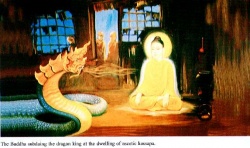Difference between revisions of "Ārammaṇa"
Jump to navigation
Jump to search
(Created page with "thumb|250px| ārammaṇa: Preoccupation; mental object . {{R}} [http://www.accesstoinsight.org/glossary.html www.accesstoinsight.org] [[Category:Buddhist...") |
m (Text replacement - "Category:Pali terminology" to "{{PaliTerminology}}") |
||
| (2 intermediate revisions by 2 users not shown) | |||
| Line 1: | Line 1: | ||
[[File:Dawn 17.jpg|thumb|250px|]] | [[File:Dawn 17.jpg|thumb|250px|]] | ||
| − | ārammaṇa: Preoccupation; mental object . | + | '''[[ārammaṇa]]''': Preoccupation; [[mental]] object . |
| + | |||
| + | '''ārammaṇa''' : [nt.] a sense-object. | ||
| + | |||
| + | '''ārammaṇa''': 'object'. There are six: visible object, sound, odor, taste, body-impression, mind-object. The mind-object ([[dhammārammaṇa]]) may be [[physical]] or [[mental]], past, present or future, real or [[imaginary]]. The 5 sense-objects belong to the corporeality-group ([[rūpakkhandha]], s. [[khandha]]). They form the external foundations for the sense-perceptions, and without them no sense-perception or sense-consciousness (seeing, hearing, etc.) can arise. Cf. [[āyatana]], [[paccaya]]. (App: paccaya 2.). | ||
| + | |||
{{R}} | {{R}} | ||
| − | [http://www.accesstoinsight.org/glossary.html www.accesstoinsight.org] | + | [http://www.accesstoinsight.org/glossary.html www.accesstoinsight.org]<br/> |
| + | [http://dictionary.buddhistdoor.com/en/word/3401/arammana dictionary.buddhistdoor.com] | ||
| + | |||
[[Category:Buddhist Terms]] | [[Category:Buddhist Terms]] | ||
[[Category:Buddhist psychology]] | [[Category:Buddhist psychology]] | ||
| + | {{PaliTerminology}} | ||
Latest revision as of 12:47, 27 April 2014
ārammaṇa: Preoccupation; mental object .
ārammaṇa : [nt.] a sense-object.
ārammaṇa: 'object'. There are six: visible object, sound, odor, taste, body-impression, mind-object. The mind-object (dhammārammaṇa) may be physical or mental, past, present or future, real or imaginary. The 5 sense-objects belong to the corporeality-group (rūpakkhandha, s. khandha). They form the external foundations for the sense-perceptions, and without them no sense-perception or sense-consciousness (seeing, hearing, etc.) can arise. Cf. āyatana, paccaya. (App: paccaya 2.).
